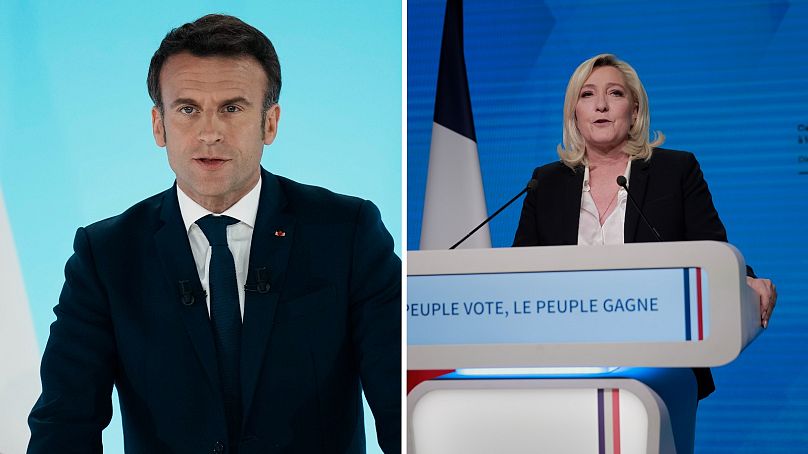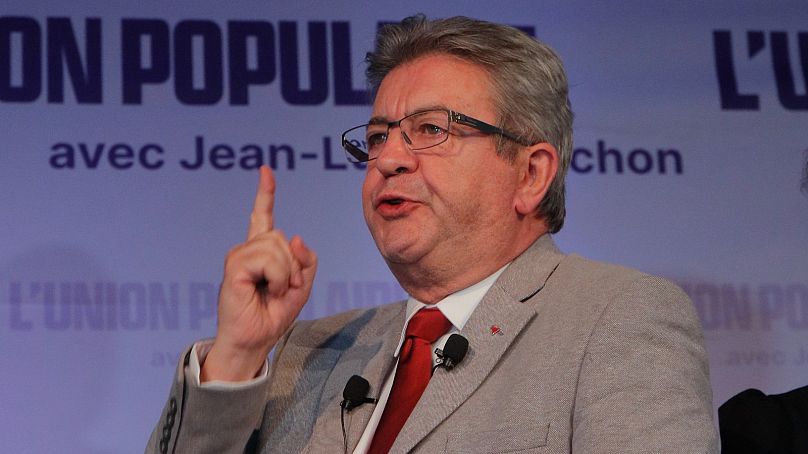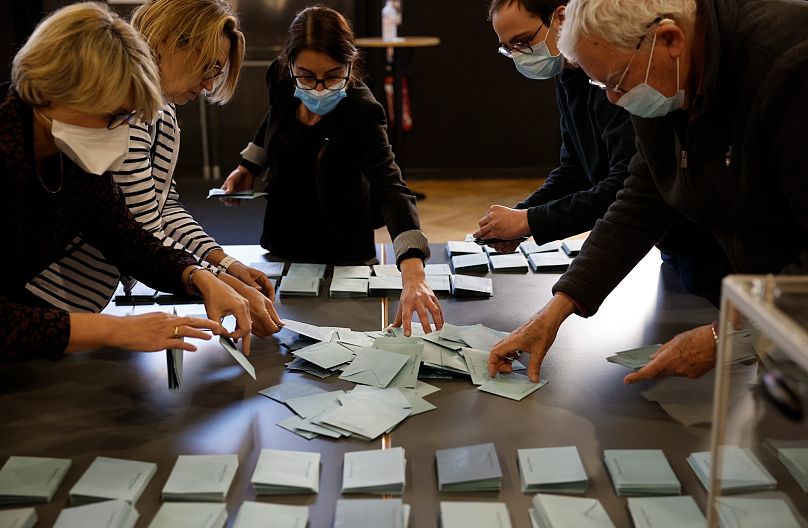The first round of France's election was marked by the far-right qualifying for the runoff, a collapse of traditional parties and a high abstention rate.
The first round of France's presidential election took place on Sunday with a high abstention rate and some of the same faces as the contest that took place five years ago.
President Emmanuel Macron remains the favourite to win the race but faces a tough challenge from far-right leader Marine Le Pen.
Here are six takeaways from the first round of the presidential election in Europe's second-largest economy.
A repeat contest of Macron vs. Le Pen but a tougher race
Once again, Emmanuel Macron will face far-right National Rally leader Le Pen in the runoff presidential race on 24 April in a repeat of the 2017 contest in what's set to be a much closer race than five years ago.
Macron finished first on Sunday at 27.8%, according to interior ministry figures, followed by Le Pen in second place at 23.1%. They were the two qualifiers for the second round of the election.
Several candidates, including Socialist Anne Hidalgo and Conservative Valérie Pécresse, have said they will support Macron in the runoff election to "block the far-right," while acknowledging their differences with the incumbent president.
Macron admitted in his speech that he knew some would only vote for him to block Le Pen and did not actually support his proposals.
Both Macron and Le Pen beat their first round results in 2017. A poll from Ifop Opinion projected a much tighter race than in 2017 in this year's runoff with Macron at around 51% and Le Pen at 49%, although another survey by Ipsos France suggests a wider margin, with Macron winning by 54%-46%.
Five years ago, Macron took two-thirds of the vote, beating Le Pen by 66%-34%.
"The two weeks of campaign ahead are going to be extremely tough: they will have to make up for the lack of campaign we experienced until now," said Tara Varma, head of the European Council on Foreign Relations' Paris office.
Jean-Luc Mélenchon finishes in third place
Far-left leader Jean-Luc Mélenchon finished in third place with a result several points higher than in the 2017 election. Monday morning's figures put the candidate from La France Insoumise (France Unbowed) within 1.2% of Le Pen, at 21.95% of the vote.
The 70-year-old French MP rose in the polls leading up to the first round and likely drew some support from Greens candidate Yannick Jadot who won less than 5% of the vote, and Anne Hidalgo, the Socialist party candidate who finished in 10th place, receiving 1.75% of the vote.
"Melenchon's party is really his kind of personal creation. And he has indicated that he won't run again for the presidency in five years' time. So the question is what's going to happen to his movement?" said Douglas Webber, an emeritus professor of political science at INSEAD.
"Will there be somebody who can step into his place? Or will his supporters drift away to other political movements? The left is in the process of a sort of radical reconstruction and where this will end is very difficult to predict."
Alexis Corbière, the spokesman for Jean-Luc Mélenchon, said there were now three major political forces in France. He added that far-left leader Mélenchon, who finished third, could have finished in the second round of the election.
"I want to thank all those who voted for us, we must now stay together," he said.
In a speech following the release of preliminary projections, Mélenchon said the fight would continue: "I never let go, I never gave in, so now it's up to you," he said.
France's traditional left and right 'collapsed almost completely'
France's traditional left-wing Socialist Party and right-wing Republicans had their lowest historical election results with Socialist Anne Hidalgo receiving under 2% of the vote and conservative Valérie Pécresse finishing with less than 5% of the vote in the first round.
The two dominant political parties in France have "collapsed almost completely at the national level," said Webber.
"As national political forces in the presidential and parliamentary elections, they're at their weakest ever," he added.
Paul Bacot, an emeritus professor at Sciences Po Lyon, said that the results for the Socialists and Republicans as well as the Greens and Communists were all potentially "catastrophic" financially as they looked to be below the threshold of 5%. This means the money spent on their campaigns is not reimbursed.
"Since the legislative elections look bad for them, their material survival is at stake," he added.
Varma at the European Council on Foreign Relations, went a bit further, stating that the two parties were "now dead", adding that "a complete reconfiguration of French politics is about to take place. It started in 2017 but will now be achieved".
Greens unable to best their 2002 results
The Greens fell a point short of beating their highest presidential results when candidate Noel Mamère won 5.25% of the vote in 2002.
"For anyone (worried about) the future of the planet and climate change and global warming, the relatively invisible role played by environmental issues in the campaign and the quite poor results of the Green candidate Yannick Jadot is certainly rather depressing and preoccupying," said Webber.
It came after the publication of yet another worrying report from the UN's Intergovernmental Panel on Climate Change (IPCC) last week that said it is essential that global greenhouse gas emissions reach their peak by 2025 at the latest.
Jadot's spokeswoman Mélanie Vogel told Euronews last week that the next French president could "allow us to move towards a livable world or an unlivable world."
After the election performance on Sunday, another Jadot spokeswoman Delphine Batho told France Inter that "political ecology must clearly change to no longer be seen as just a whistleblower" or a check on power, but as "capable to assume its responsibilities."
They put out a call for donations after failing to achieve 5% of the vote.
"To continue the fight that drives them, environmentalists must raise 2 million euros by May 15, 2022. Ecology needs you. Donate," the Europe Ecology the Greens party wrote.
French voters faced with two very different programmes
Webber said there was a new political line of conduct in France that was no longer the question of right and left but more a "cosmopolitan, liberal, internationalist" camp on Emmanuel Macron's side and an "insular, conservative nationalist" camp with Marine Le Pen.
"French voters are going to be posed with a very fundamental choice between these two directions," he said.
Varma adds that the two platforms the candidates present have "very different outlooks on European and foreign policy and subsequent different consequences for European sovereignty, NATO membership, migration."
Many called on French voters to support Emmanuel Macron, with Greens spokeswoman Batho stating "France cannot, in 15 days, become Vladimir Putin's ally. France cannot let institutional racism take hold."
She said it wasn't a vote for Macron but a vote for France.
High abstention rate continues to dog French elections
France's abstention rate again remained high for a presidential election at 26.31%, according to interior ministry figures.
While it was not the record abstention rate for the first round of a presidential election, it was one of the highest abstention rates since 1965.
Several young French voters told Euronews ahead of the election that they did not believe in voting in a presidential election.
Gaspard Hermann, a 24-year old construction worker, told Euronews that most people vote against a candidate instead of for their beliefs.
He feels that politicians are out of touch with what the working class needs in their daily lives.














